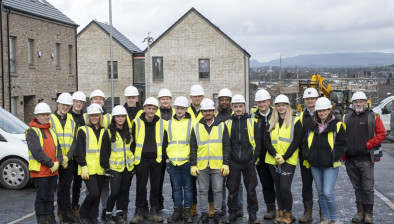Regular refresher training could cut wind farm deaths
Wind turbine technicians are at risk of fatal accidents or serious injury without regular refresher training, according to a study by researchers at Glasgow Caledonian University (GCU).
Wind technicians struggle to recall key emergency steps within a month of their initial training and need regular practice to maintain their skill level, research has found.
Union leaders last year called for more work to be done to protect the safety and wellbeing of technicians after two workers died at windfarms in Scotland.
The GCU study tested 30 wind technicians, who were mostly new or non-regular climbers, in the procedural use of rescue kit over a three-month period.
Average competency levels dropped rapidly within one month of initial training without any routine hands-on practice.
Wind technicians are required to carry out maintenance and repairs on commercial-scale turbines, with an average height of 60 to 100 metres.
Current guidance, from trade associations RenewableUK and the Global Wind Organisation (GWO), requires operators to have rescue training every 24 months.
Dr Kenneth Lawani, lecturer and researcher in Construction Management at GCU, said: “The research shows the level of skill and knowledge drops rapidly after a month and progressively afterward.
“Every time you fly in a plane, you receive a full safety briefing to remind you of what happens in an emergency. If you work offshore, every time you embark on a helicopter ride, you watch a video of what you need to do in case there’s a crash.
“Why don’t we have something like that for wind turbine technicians? Accidents don’t happen every day but if something goes wrong, it can be fatal.”
The GCU research team, which includes Dr Lawani and Professors Billy Hare and Iain Cameron, believe video technology and mobile apps can offer a cost-effective way to deliver top-up refresher training, specifically focused on emergency rescue procedures.
Dr Lawani added: “In a real-life situation, panic can set in but if the knowledge is fresh in your mind, it can save your life.
“For many organisations it’s not practical to run regular, life-sized rescue and emergency simulations.
“Digital technology is becoming more affordable and VR is already being used for pilot training and practice, and in the medical profession for surgeons. Apps would also be a quick way to offer a visual reminder of the emergency steps.”
Steven Dillon, regional coordinating officer at Unite Scotland, said: “We fully support the findings of this study. Safety briefings need to be regularly reinforced and workers also must have the confidence to raise safety concerns
“This is especially important in wind farms where workers are often required to work in remote isolated locations. Regular safety briefings and proper worker engagement in their own safety are essential to reduce risks.”























